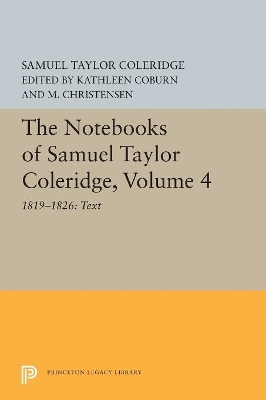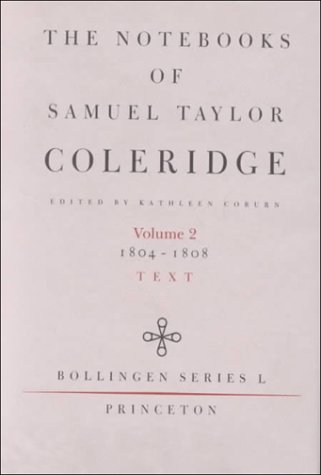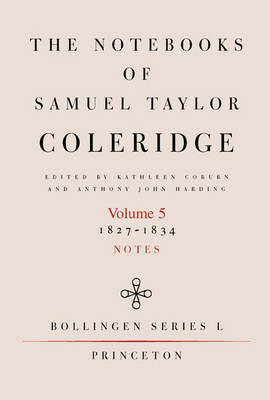Notebooks of Samuel Taylor Coleridge
5 total works
The Notebooks of Samuel Taylor Coleridge, Volume 4
by Samuel Taylor Coleridge
During his adult life until his death in 1834, Coleridge made entries in more than sixty notebooks. Neither commonplace books nor diaries, but something of both, they contain notes on literary, theological, philosophical, scientific, social, and psychological matters, plans for and fragments of works, and many other items of great interest. This fourth double volume of the Notebooks covers the years 1819 through 1826. The range of Coleridge's reading, his endless questioning, and his recondite sources continue to fascinate the readers. Included here are drafts and full versions of the later poems. Many passages reflect the technological interests that led to Coleridge's writing of Aids of Reflection, later to become an important source for the Transcendentalists.
Another development in this volume is the startling expansion of Coleridge's interest in "the theory of life" and in chemistry--the laboratory chemistry of the Royal Institution of Great Britain and the theoretical chemistry of German transcendentalists such as Okea, Steffens, and Oersted. Also contained in this volume is an important section on the meaning of marriage.
Kathleen Coburn is Professor Emeritus at Victoria College of the University of Toronto. Merton Christensen was Professor of English at the University of Delaware.
Bollingen Series L:4.
Originally published in 1990.
The Princeton Legacy Library uses the latest print-on-demand technology to again make available previously out-of-print books from the distinguished backlist of Princeton University Press. These editions preserve the original texts of these important books while presenting them in durable paperback and hardcover editions. The goal of the Princeton Legacy Library is to vastly increase access to the rich scholarly heritage found in the thousands of books published by Princeton University Press since its founding in 1905.
The Notebooks of Samuel Taylor Coleridge, Volume 2
by Samuel Taylor Coleridge
The Notebooks of Samuel Taylor Coleridge, Volume 3
by Samuel Taylor Coleridge
This third volume covers the period from Coleridge's first lectures on poetry, at the Royal Institution, and the inception of The Friend, to his last lecture in 1819. It is, therefore, the period of his various courses of lectures on Shakespeare and other literary subjects, and on philosophy, of the Biographia Literaria, and the Lay Sermons. During this time, Coleridge's close friendship with Wordsworth deteriorated, ending in an estranging quarrel. His drug addiction was deepest during these years of his life, until he finally found haven in Dr. Gillman's house at Highgate.
The Notebooks of Samuel Taylor Coleridge, Volume 1
by Samuel Taylor Coleridge
Some 1,800 entries, representing the "annus mirabilis" of 1797-1798, descriptions of the Lake Country, and notes on Coleridge's travels in Germany.
The Notebooks of Samuel Taylor Coleridge, Volume 5
by Samuel Taylor Coleridge
He planned a major work on Logic (still unpublished at his death), and an outline of Christian doctrine, also unfinished, though his work toward this project contributed to On the Constitution of the Church and State (1830) and the revised Aids to Reflection (1831). The reader of these notebooks has the opportunity to see what one of the most admired minds of the English-speaking world thought on several issues--such as race and empire, science and medicine, democracy (particularly in reaction to the Reform Bills introduced in 1831 and 1832), and the authority of the Bible--when he wrote without fear of public disapprobation or controversy.



